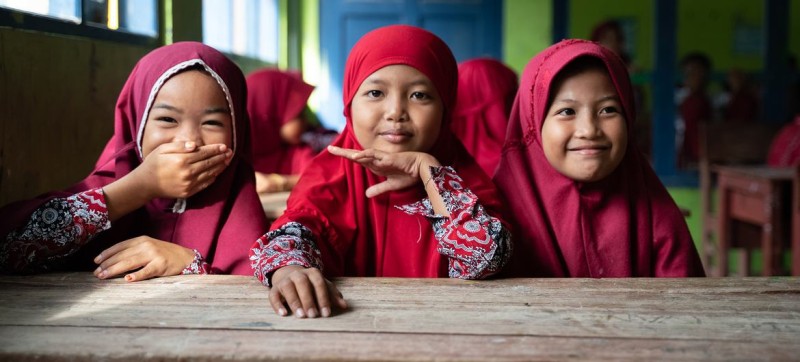
© UNICEF/Clark Girls await their turns to get immunized at Rusung Raya Elementary School, in Indonesia.
Secretary-General António Guterres was addressing the annual opening of the World Health Assembly, the decision making body of the WHO, and said that the agency was born out of a spirit of cooperation, leading to dramatic improvements in human health.
Tweet URL
“Global life expectancy – up over 50 percent; Infant mortality – down sixty percent in 30 years; smallpox – eradicated; And polio on the verge of extinction.
But progress is in peril. War and conflict threaten millions. The health of billions is endangered by the climate crisis.”
He said COVID-19 had stalled and even reversed, the steady improvements in public health, and led to backsliding on the 2030 Sustainable Development Goals (SDGs).
‘We can return to the path of progress’
“But this is not inevitable”, he continued. We can return to the path of progress. We can realize our ambitions for health and wellbeing for all. But only if the world works together. If we cooperate, despite the tensions straining relations between nations.”
He said promoting public health long-term, meant strengthening the independence, authority and financing of the WHO, “which stands at the heart of our international effort” and must have a key coordinating role in fighting the next pandemic.
As international negotiations continue for a new pandemic plan of action, “it is vital to prepare for the health threats to come – from new pandemics to climate dangers – so that we prevent where we can, and respond fast and effectively where we cannot”, the UN chief said.
No carrying on as before: Tedros
Reinforcing that message in his introductory speech to the Assembly, WHO Director-General Tedros Adhanom Ghebreyesus, said that the world’s emergence from the dark tunnel of COVID-19, was “not just the end of a bad dream from which we have woken. We cannot simply carry on as we did before.”
The painful lessons of the pandemic must be understood, he said.
“Chief among those lessons is that we can only face shared threats with a shared response.”
Similar to the WHO Framework Convention on Tobacco Control, the pandemic accord under negotiation, “must be a historic agreement to make a paradigm shift in global health security, recognising that our fates are interwoven”, he added.
“This is the moment for us to write a new chapter in global health history, together; to chart a new path forward, together; to make the world safer for our children and grandchildren, together.
New disease protection network launched
The Assembly opened as WHO and partners launched a new global network to help protect people everywhere from infection disease threats, through the power of pathogen genomics.
The International Pathogen Surveillance Network (IPSN) will provide a platform to connect countries and regions, improving systems for collecting and analyzing samples, using data to drive public health decision-making, and sharing that information more broadly, said WHO in a press release.
Pathogen genomics analyzes the genetic code of viruses, bacteria and other disease-causing organisms to understand how infectious they are, how deadly they are, and how they spread.
The IPSN will have a Secretariat hosted by the WHO Hub for Pandemic and Epidemic Intelligence, with an ambitious goal, “that can also play a vital role in health security: to give every country access to pathogen genomic sequencing and analytics as part of its public health system,” said Tedros.
“As was so clearly demonstrated to us during the COVID-19 pandemic, the world is stronger when it stands together to fight shared health threats”, he said.

